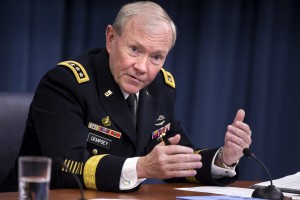Special to WorldTribune.com
WASHINGTON — Less than three years after its withdrawal, the United States has encountered significant obstacles in resuming training and coordination with Iraq’s military.
Officials said the Defense Department and Joint Chiefs of Staff have concluded that 50 percent of Iraq’s military was incapable of working with U.S. advisers to stop Islamic State of Iraq and the Levant.

The officials said these units, almost all of them in the Iraq Army, were either deemed unreliable, untrustworthy or linked to Iran or the former regime of President Saddam Hussein.
“This is about training them in protected locations and then enabling them,” Gen. Martin Dempsey, chairman of the Joint Chiefs of Staff, said.
Officials said many of the brigades deemed capable of working with Washington remain ill-equipped and -manned. They said at least five of the army’s 14 divisions collapsed during the ISIL sweep through northern Iraq in June 2014. Since then, some 50 percent of the deserters have sought to return to their decimated units.
In a briefing on Sept. 17, Dempsey, a former U.S. military commander in Iraq, said any American program to enhance Baghdad’s military and security capabilities would take years. He said a study by U.S. Central Command determined that 24 of the 50 brigades in the Iraq Army could not host U.S. advisers. The 24 brigades, he said, were dominated by Shi’ites believed aligned with Iran.
The remaining 26 brigades were deemed capable of receiving U.S. military support. Dempsey did not elaborate.
“They appear to have a national instinct, instead of a sectarian instinct,” Dempsey said.
In his briefing, Dempsey acknowledged that U.S. air strikes could not defeat ISIL. He said Baghdad would be asked to grant immunity to the U.S. military presence in Iraq, which now exceeds 1,200 and expected to reach 3,000. So far, the Iraqi government has refused, which elicited concern from Congress.
“When you start looking at what we’ve spent — almost $20 billion trying to build up a 280,000-person army in Iraq and the first time they were tested they turned tail and ran,” Sen. Joseph Manchin, a West Virginia Democrat, said in a Senate Armed Services Committee hearing on Sept. 16.

You must be logged in to post a comment Login